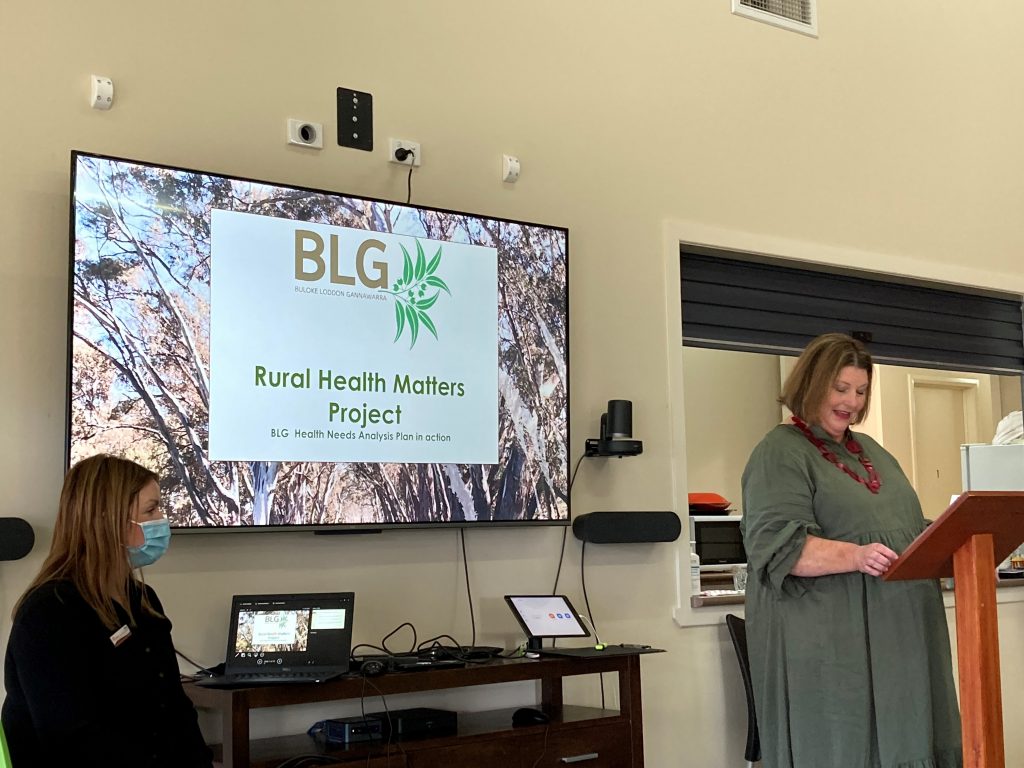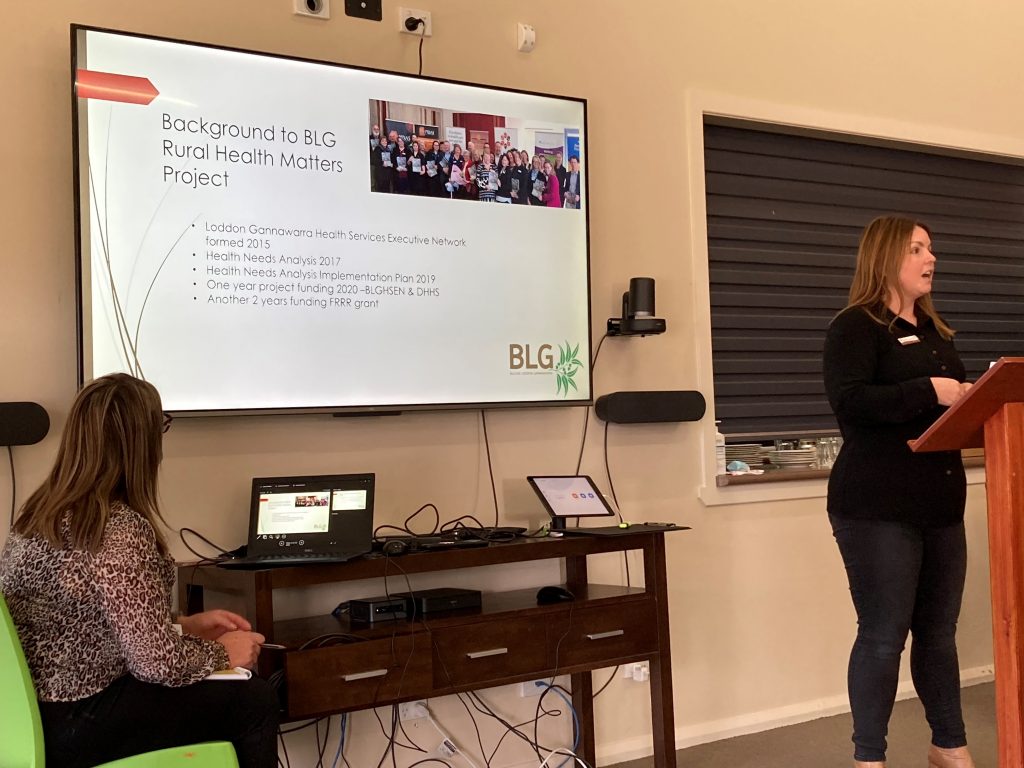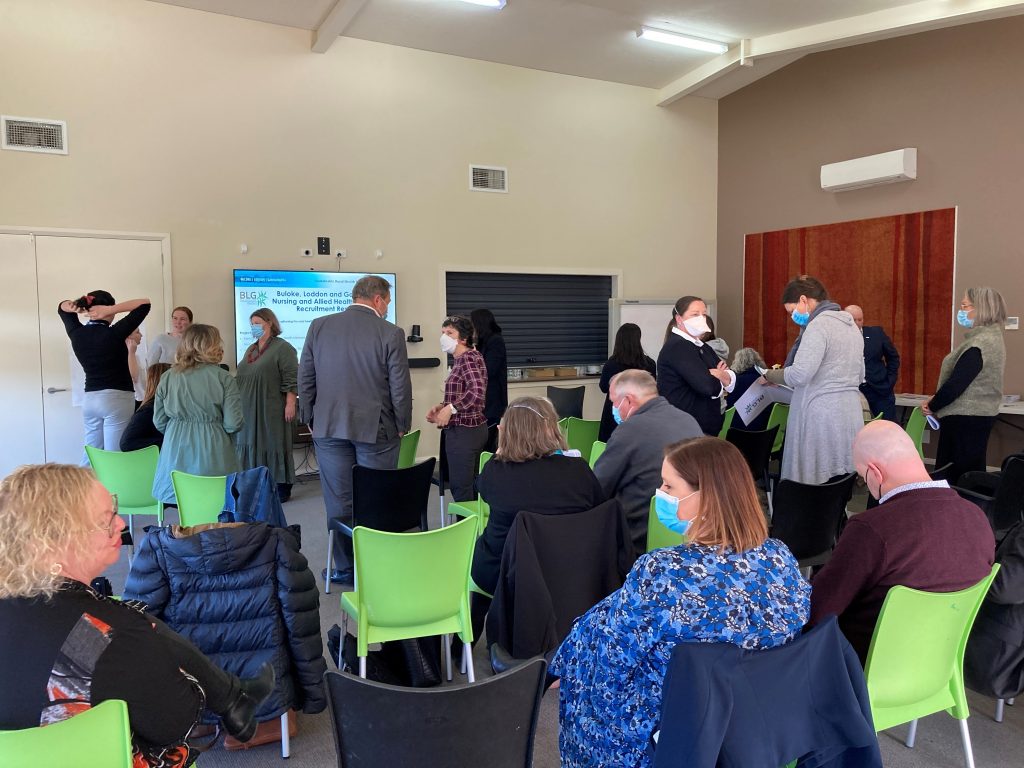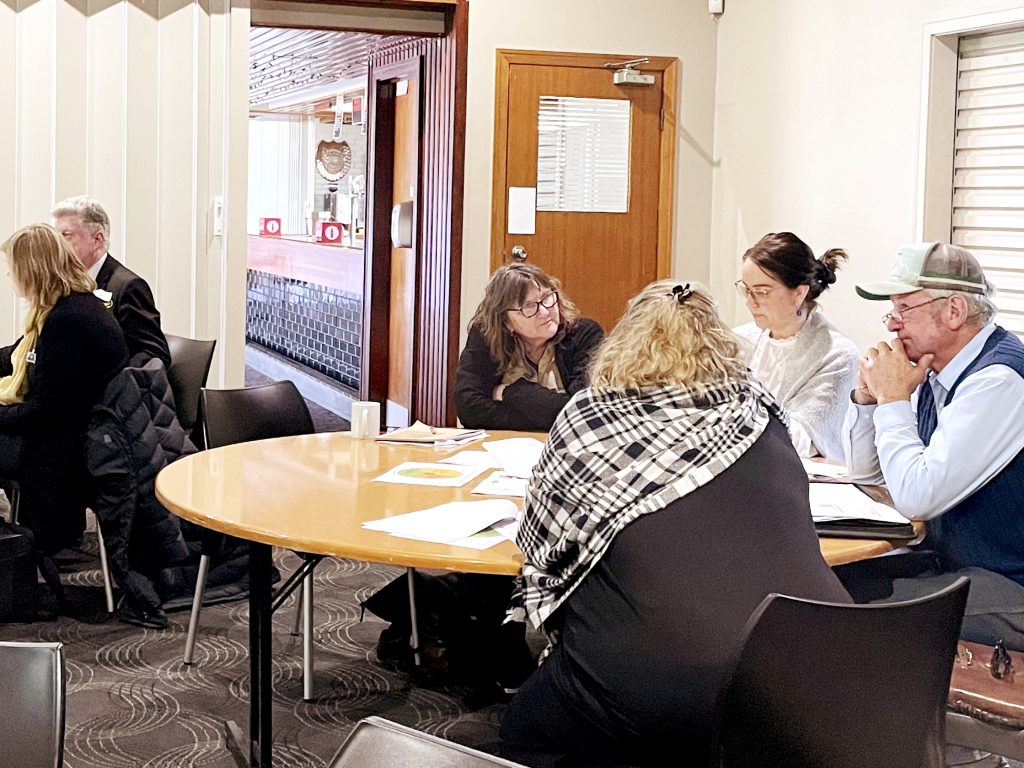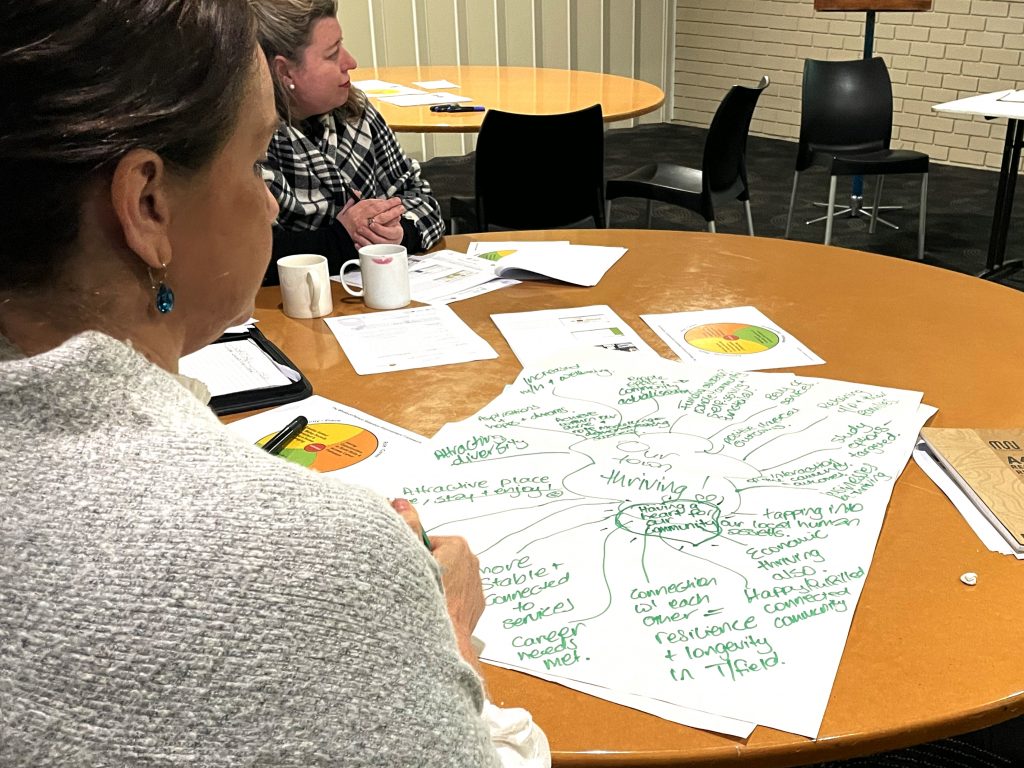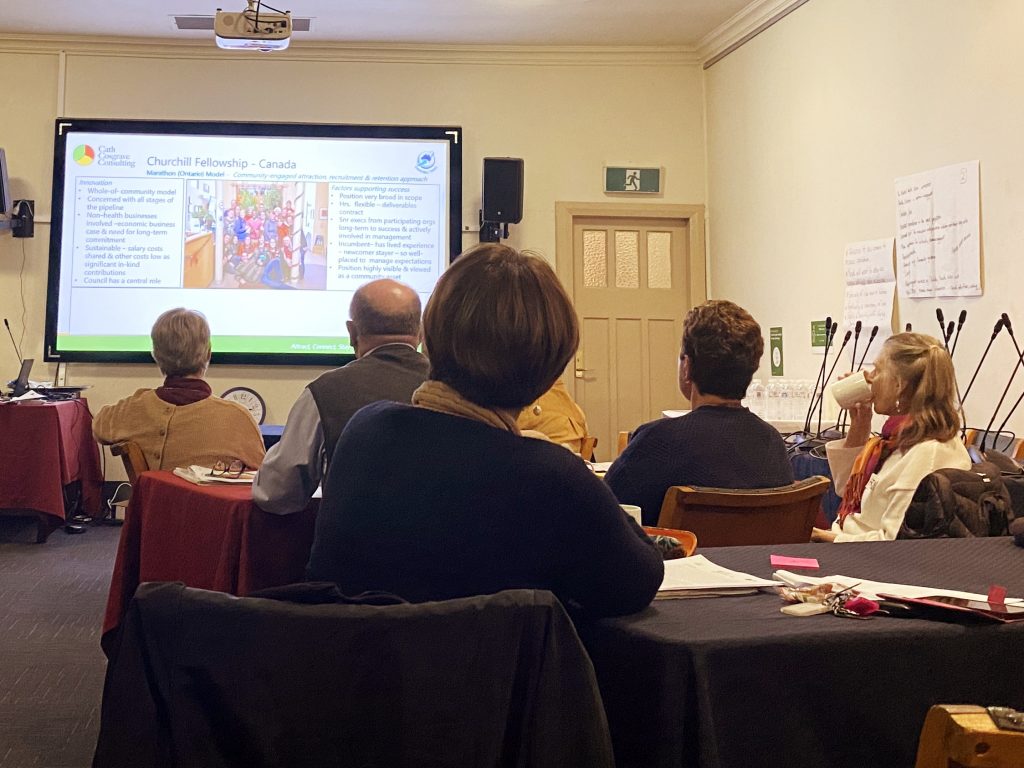Foundation for Rural & Regional Renewal (FRRR)
Health care in rural areas is so often lacking and this scarcity of services, coupled with workforce shortages, means that many chronic health conditions are poorly managed and preventative health programs can be hard to find.
That’s why our Program Coordinator, Jeanice Henderson, was excited to travel to Kerang in northern Victoria last month to learn more about the progress of the innovative Rural Health Matters project.
Funded through an FRRR Enhancing Country Health Outcomes (ECHO) grant in 2020, Northern District Community Health (NDCH) is making good use of their $115,000 grant, funded by Beyond Medical Education. They have employed Emily Wood as Buloke, Loddon and Gannawarra (BLG) Project Coordinator, and are leveraging a truly inspirational health partnership spanning three Local Government Areas and multiple health services. This collaborative placed-based, systems approach is delivering a suite of local initiatives to help improve the current and emerging health needs for BLG Shire residents.
Plans for the original launch of the Rural Health Matters project were thwarted by COVID lockdowns. However, Mandy Hutchinson, CEO of NDCH said the delays meant the August event became a real celebration of what has been achieved so far and what is to come; a chance to share and applaud the amazing work and local partnerships that are starting to shift the dial on local health outcomes.
It was easy to see from the original grant application that a lot of the hard work had already been done. The BLG Local Health Community Services had researched and created the ambitious BLG Health Needs implementation plan, and made a solid start on various projects.
The FRRR ECHO grant is helping them to take this to the next level. Emily has been tasked with mapping the current health service provision across the three Shires and identifying the existing gaps and opportunities for further collaboration. She is also responsible for running a community awareness campaign for Heart Health risk factors; developing an allied health community of practice with a focus on chronic disease management and bringing people together for an annual chronic health forum; and working closely with new initiatives such as the Sustainable Rural Health Project.
Emily said that the ECHO grant for the Rural Health Matters (RHM) project has enabled a backbone for additional work to be developed, implemented, or supported and promoted across the BLG region.
“Alongside the identified KPI’s of the RHM project, there has been the opportunity to continue facilitation of an existing Chronic Disease Management: Community of Practice (COP) for allied health professionals and nurses which had previously had facilitation funding for 12 months through Murray PHN. This role enabled not only the continuation of the COP but also allowed me to act as a conduit between the systems level planning and the on the ground experience and feedback of the allied health staff – as was the case with the Murray PHN Sustainable Rural Health project.
“I have also been able to support the application for the Smoking Research Project, which has since been funded by the Department of Health. Currently the RHM project is also supporting the facilitation of a reference group for the Smoking Research Project and the development of an EOI for the position.
“Alongside this work, the RHM project has enabled me to participate in a range of BLG network meetings involving Community Health and Health Promotion – ensuring alignment of work and priorities where possible but also avoiding duplication. I’ve also been able to support and work closely with the Murray PHN Sustainable Rural Health Project, the AgriSafe Clinics at NDCH and both the MoveIT! Project and the Healthy Heart of Victoria project in Loddon.
“Lastly, it cannot be overlooked that the meetings of the BLG for the RHM project oversight also facilitated COVID coordination and support between local health services through sharing of learnings, experiences and challenges during meetings. The ongoing opportunity for the health services across the BLG region to discuss COVID at these meetings has not only strengthened relationships but created partnerships and pathways for support that will continue to benefit the BLG community.”
Jeanice said, “It was really heart-warming to see and feel the incredible level of genuine enthusiasm and commitment in the room on the day. The depth and breadth of collaboration between the groups represented at the event was amazing, but so too their willingness to seek greater collaboration with others. It was also inspirational and affirming to hear how the ECHO grant has triggered further investment.“
Nari Nari Country
On average, people in rural and remote Australia experience much higher rates of chronic disease, avoidable illness, and are far more likely to be hospitalised in circumstances where earlier access to the right care could have prevented it. Sadly, they also find it much harder to access allied health professional services: they are often thin on the ground or not there at all.
One of the main reasons for this is the difficulty in attracting and retaining rural health workers, leading to serious gaps and inequity in access to preventative and primary health care in rural and remote areas. While connection to community and place is increasingly being identified as an important factor for retention, there are few examples of how rural communities can foster or create these conditions in a systematic way.
But one organisation is trying to help resolve this. Services for Rural and Remote Allied Health (SARRAH) is a grassroots organisation advocating on behalf of rural and remote Australian communities to have access to allied health services. SARRAH is also the peak body representing rural and remote allied health professionals (AHPs) working in public, private and/or community settings.
They received a grant for just over $140,000 through FRRR’s Enhancing Country Health Outcomes (ECHO) program, funded by Beyond Medical Education, to address persistent rural health workforce shortages in small rural and remote towns in NSW and Victoria through a project leveraging Rural Health Workforce Coordinators (RHWC).
The project team is headed by Dr Cath Cosgrave, a leading research academic in the field of rural health workforce attraction and retention.
Generally, retention research has focused on the influence of organisational and role conditions, however how individuals feel and perceive their acceptance into a community is increasingly proving to significantly influence retention. Dr Cosgrave’s findings, along with other research, indicate that the decision of a health professional to take up, stay or leave a rural position involves personal, organisational and social considerations. People who relocate to a rural place for work and have persistent feelings of social alienation and loneliness will always leave, irrespective of whether the position is financially beneficial.
That’s the key insight that informed the creation of the Attract, Connect, Stay project, which is based on a successful model developed in Marathon, Canada. The translation of this model into the rural Australian context will benefit not just the communities involved in the project but develop tools and resources that can be applied more broadly.
The project involves a whole-of-community approach to supporting health professionals and their partners / families when moving into a new rural community to help them to feel settled, become socially connected, and experience a sense of belonging, all identified as essential conditions for retention.
Planning commenced with three New South Wales pilot local government areas in August 2021: Glen Innes, Gwydir Shire and Narrabri. These communities will be supported through a series of co-designed workshops to form a network of community, local government, businesses and health service representatives. These networks will go on to jointly develop, fund, recruit, appoint, manage and monitor the RHWC position and its’ success in attracting and retaining suitable health professionals to fill health service gaps in each community.
Learnings from the three NSW primary sites will be captured in prototype tools and resources, and further tested in two secondary sites in rural Victoria. The project will conclude with a launch of a purpose-built website where the refined tools and resources will be made available to the public. This will allow other communities to use the tools and resources to help design local approaches to address gaps in their own primary and preventative health workforces.
“We need to see more community-led and innovative projects like Attract, Connect, Stay to ensure rural and remote communities have access to health professionals to the same extent as their city-based counterparts.”
Cath Maloney, SARRAH CEO
Grants of up to $150,000 available for Enhancing Country Health Outcomes
Bendigo, 5 May 2020: The Foundation for Rural and Regional Renewal (FRRR) is inviting not-for-profit organisations to apply for an Enhancing Country Health Outcomes (ECHO) grant to deliver initiatives that improve the health of people living in rural, regional and remote Victoria and New South Wales.
Rural communities face distinct challenges associated with distance and isolation, which place these regions at greater risk of poorer health management and outcomes than those living in metropolitan areas. In addition to these challenges, many parts of NSW and Victoria have been affected by drought, bushfires and now COVID-19, all of which have significant impacts on health care resources.
The ECHO grants program launched in 2018 thanks to a generous donation from Beyond Medical Education. The program offers targeted grants of between $50,000 and $150,000 for charitable initiatives delivered by not-for-profit organisations to strengthen, improve access to, and retain the quality of relevant and appropriate primary health care services in rural, regional and remote Victoria and NSW.
FRRR CEO, Natalie Egleton, says that basic health services, programs and equipment are vital to the sustainability of rural communities.
“Many of Victoria and New South Wales’ rural communities have limited access to appropriate primary health care. This has been compounded by the drought, bushfires, and now by the COVID-19 pandemic, and highlights the real need for communities to be able to attract resources and implement sustainable, best practice models that will see better health outcomes for local residents.
“Last year, we awarded $475,000 in grants through this program, and it’s great to see them making a real difference in the community. For example, Latrobe Community Health Service received a grant of $125,200 to implement the ‘Telkaya Project – Very Brief Advice For Behavioural Change’. Through this project, LCHS developed online training and support materials regarding lifestyle changes around smoking, nutrition, alcohol and physical activity. Staff are now able to integrate this intervention advice into their routine primary health care services.
“Mallacoota Community Health, Infrastructure and Resilience Fund, in Victoria, was another ECHO grant recipient, using $136,864 to help the local medical clinic get additional health services up and running. Patients can now access services including a general mental health program and Teen Clinic and a piloted nurse-led after-hours service, which has been particularly valuable given the impact of the fires,” said Ms Egleton.
Other types of rural and regional focussed projects that could be eligible include innovative primary health care training and leading-edge professional development to address an identified local need; measures to enhance the retention of primary health care services; or fostering local partnerships to develop better primary health care models. Full details and other examples are available in the program guidelines.
“The bushfires and COVID-19 have emphasised the real need for quality primary health services in rural and regional areas. Building strong and sustainable relationships that support the health of these communities is critical. It’s wonderful to be able to provide support for projects on the ground that foster this kind of long-term, health care provider collaboration,” said Ms Egleton.
Applications can be made via FRRR’s Grants Gateway, and close at 5pm AEST, 9 June 2020. Outcomes will be advised mid-August 2020.

